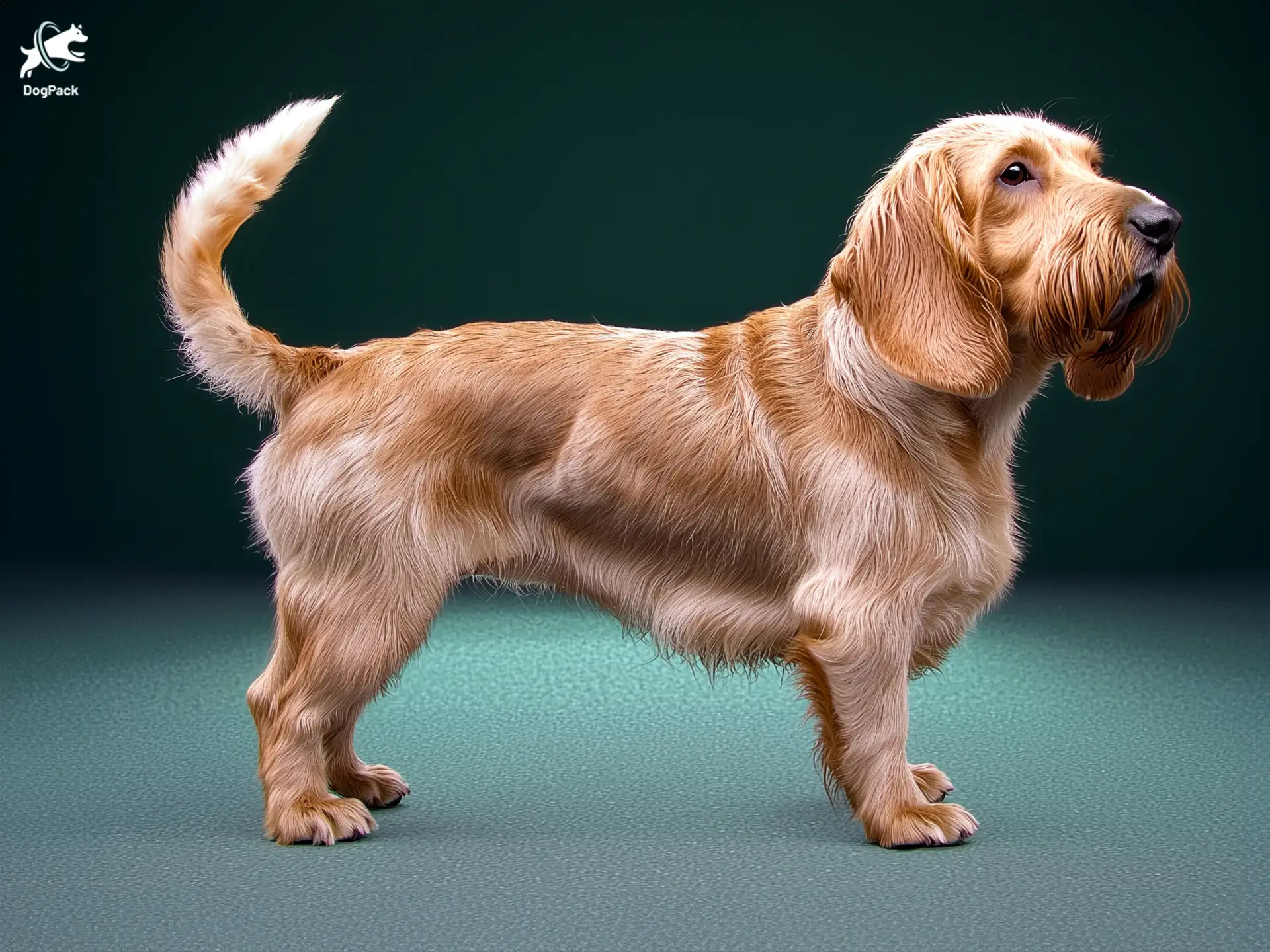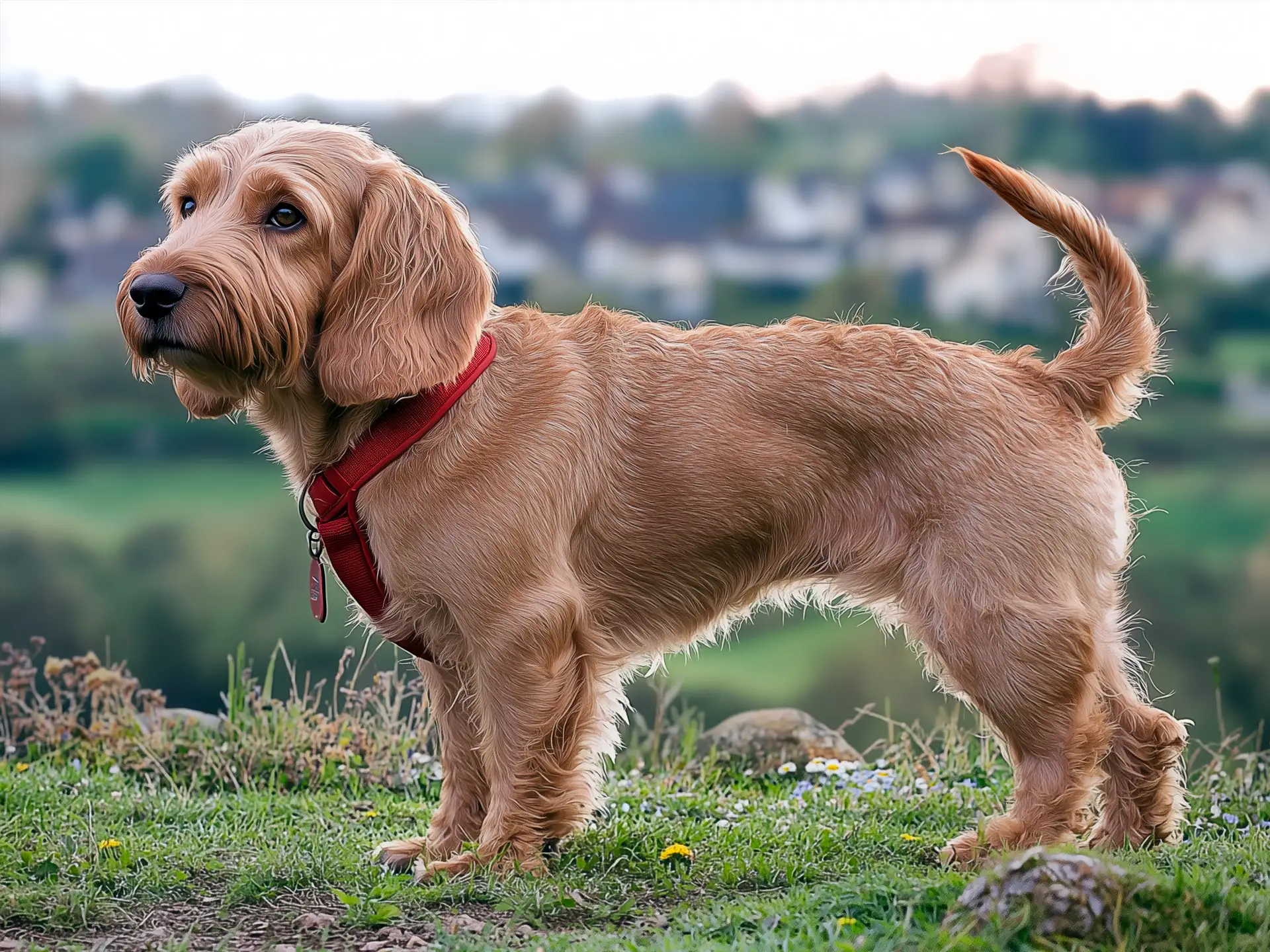Basset Fauve de Bretagne Dog Breed Info & Overview
The Basset Fauve de Bretagne is a small yet spirited hound from France, cherished for its friendly nature and sharp hunting instincts. With its distinct reddish coat and keen sense of smell, this breed excels in the field but is just as lovable at home. Whether you’re an outdoor enthusiast or simply looking for a loyal and lively companion, the Basset Fauve de Bretagne’s charm and energy make it a delightful addition to any family.
Characteristics
Pictures
Breed History
Originating from the Brittany region of France, the Basset Fauve de Bretagne has a rich history dating back to the 16th century. Initially bred from the now-extinct Grand Fauve de Bretagne, these dogs were developed to hunt small game like rabbits and hares. Their compact size and tenacious spirit made them favorites among French hunters navigating dense terrain.
After World War II, the breed faced near extinction due to the ravages of war. Dedicated enthusiasts worked tirelessly to revive the Basset Fauve de Bretagne, carefully breeding to restore its numbers and preserve its unique characteristics. Their efforts paid off, and the breed regained popularity not only in France but also started gaining attention internationally.
The name “Fauve” translates to “fawn” in French, reflecting the breed’s distinctive reddish coat color. Today, while still considered rare outside its homeland, the Basset Fauve de Bretagne continues to charm dog lovers with its blend of hunting prowess and affectionate nature. Its history is a testament to resilience and the dedication of breed aficionados.
Temperament, Personality
If you’re looking for a dog with a zest for life, the Basset Fauve de Bretagne fits the bill. This breed is known for its cheerful and outgoing personality. They are energetic and love to be part of family activities. Their playful nature makes them excellent companions for children, always ready for a game or an adventure.
While friendly with their human family, they can be a bit stubborn, a trait common among hounds. Early socialization is key to ensure they get along well with other pets. Their hunting instincts may lead them to chase smaller animals, so introducing them to other household pets gradually is advisable.
When it comes to strangers, the Basset Fauve de Bretagne is generally welcoming but may exhibit a slight aloofness until they warm up. They’re not typically aggressive but can be vocal, making them good watchdogs. Their affectionate demeanor combined with their spirited personality makes them a joy to be around.
Physical Characteristics
Sporting a dense, wiry coat that comes in shades of fawn to red, the Basset Fauve de Bretagne is a small but sturdy hound. Their short legs and elongated body give them a distinctive appearance typical of basset breeds. Despite their stature, they are well-muscled and built for endurance.
One of their most charming features is their expressive eyes, often dark brown, which convey a sense of warmth and intelligence. Their ears are medium-length, hanging close to the head, adding to their endearing look. The breed’s tail is carried gaily and is of medium length, tapering to a point.
Their coat is rough to the touch, providing protection against harsh brush and weather when out hunting. Interestingly, the Basset Fauve de Bretagne doesn’t have an undercoat, which means they may be less suited to very cold climates without proper care. Overall, their physical attributes are a blend of functionality and charm.
Health Issues
Generally, the Basset Fauve de Bretagne is a healthy breed with a robust constitution. However, like all breeds, they can be prone to certain health issues. Hip dysplasia is one condition to watch for, where the hip joint doesn’t fit properly, potentially leading to arthritis.
Another concern can be ear infections due to their floppy ears, which can trap moisture and debris. Regular ear cleaning can help prevent infections. Also, being a scent hound with a strong appetite, they may be prone to obesity if not exercised adequately and fed appropriately.
It’s advisable to schedule regular check-ups with a veterinarian to monitor their overall health. Responsible breeders often screen for genetic conditions, so acquiring a Basset Fauve de Bretagne from a reputable source can minimize health risks. Maintaining a balanced diet and regular exercise will contribute to a long, healthy life.
Grooming Needs
One of the perks of owning a Basset Fauve de Bretagne is their relatively low-maintenance grooming needs. Their wiry coat is dirt-resistant and doesn’t mat easily. A good brushing once a week is usually sufficient to keep their coat healthy and remove dead hairs.
They are moderate shedders, so regular brushing can help manage loose hair around the house. Bathing is only necessary when they get particularly dirty or start to develop a doggy odor. Overbathing can strip their coat of natural oils, so it’s best to keep baths occasional.
Don’t forget about nail trimming and dental care. Their nails should be trimmed regularly to prevent overgrowth and discomfort. Brushing their teeth several times a week can help prevent dental issues. Overall, the Basset Fauve de Bretagne’s grooming routine is straightforward and manageable.
Exercise Requirements
The Basset Fauve de Bretagne is an active and energetic breed that requires ample exercise to stay happy and healthy. They were bred for hunting and have plenty of stamina, so daily walks are a must. Aim for at least 1–2 hours of physical activity each day.
These dogs love to explore, so taking them to new environments like parks or trails can be very stimulating. Keep in mind their strong scenting abilities; they might catch a whiff of something interesting and decide to follow it. For this reason, keeping them on a leash or in a secure area is important.
Interactive games like fetch or scent work can also keep their minds engaged. The Basset Fauve de Bretagne excels in activities like tracking and agility training. Providing both mental and physical stimulation will help prevent boredom and the development of unwanted behaviors.
Training Tips
Training a Basset Fauve de Bretagne can be both rewarding and challenging. Their intelligence is a double-edged sword; they learn quickly but can also be quite independent and stubborn. Consistency and patience are key when working with this breed.
Positive reinforcement methods work best. Use treats, praise, and play to motivate them. Harsh training techniques can backfire, leading to resistance or anxiety. Early socialization is crucial to help them interact well with other dogs and people.
Because of their strong hunting instincts, recall training should be a priority. Teaching them to come when called can prevent them from wandering off after an interesting scent. Enrolling in obedience classes can also provide structure and help reinforce good behaviors in your Basset Fauve de Bretagne.
Nutrition, Diet
Feeding a Basset Fauve de Bretagne requires attention to their energetic lifestyle and tendency to overeat. They do best on a high-quality dog food formulated for active breeds. Considering their size, they typically need about 1.5 to 2 cups of dry kibble per day, divided into two meals to prevent overeating.
Due to their hunting background, they benefit from a diet rich in protein to support muscle development and energy levels. Look for foods that list meat as the first ingredient. Omega fatty acids can help maintain their wiry coat’s health, so consider foods that include fish oil or flaxseed.
Be cautious with treats and table scraps, as the Basset Fauve de Bretagne can gain weight easily. Obesity can lead to health issues like joint strain and heart problems. Regularly monitor their weight and adjust portion sizes as needed. Consulting with a veterinarian can provide personalized dietary recommendations.
Adoption, Breeders
Finding a Basset Fauve de Bretagne might take some effort due to their rarity outside France. Start by contacting breed-specific clubs such as the Basset Fauve de Bretagne Club of America. They can provide resources and references to reputable breeders who adhere to ethical breeding practices.
When choosing a breeder, ask about health clearances, the puppy’s lineage, and any genetic testing performed. Visiting the breeder in person, if possible, allows you to see the living conditions and meet the puppy’s parents. Avoid breeders who cannot provide documentation or seem hesitant to answer questions.
Alternatively, consider adoption through rescue organizations dedicated to the breed. While rare, sometimes Basset Fauve de Bretagne dogs are in need of a new home. Websites like Petfinder occasionally list them. Adopting can be a rewarding way to provide a loving home to a dog in need.
Family Pet?
The Basset Fauve de Bretagne makes an excellent family pet for those who can match their energy levels. They are affectionate and enjoy being part of family activities. Their playful nature aligns well with children, and they often become loyal companions to kids who engage with them.
When it comes to other pets, early socialization is important. They can get along with other dogs, especially if raised together. However, their hunting instincts may kick in around smaller animals like cats or rodents. Supervised introductions and consistent training can help mitigate potential issues.
Their friendly demeanor extends to visitors as well, although they might be reserved initially. The Basset Fauve de Bretagne thrives in an environment where they receive plenty of attention and interaction. Families who appreciate an active, loving dog will find this breed to be a delightful addition.
Right For You?
If you’re an active individual or family looking for a dog that can keep up with your lifestyle, the Basset Fauve de Bretagne could be a great match. They require ample exercise and mental stimulation, so they’re best suited for homes where they won’t be left alone for long periods.
Potential owners should be prepared for a dog with a strong will and a nose for adventure. Secure fencing is a must, as they might follow a scent right out of your yard. Apartment living might not be ideal unless you’re committed to providing sufficient exercise.
Ultimately, the Basset Fauve de Bretagne is for those who appreciate a spirited, loving companion. If you’re willing to invest time in training and can provide an active environment, this breed will reward you with endless affection and entertainment.
Conclusion
In summary, the Basset Fauve de Bretagne is a lively and affectionate breed that brings joy to any active household. Their rich history and unique characteristics make them a fascinating companion. While they require commitment in terms of exercise and training, the rewards are plentiful. If you’re seeking a dog that’s both a spirited adventurer and a loving family member, this rare French gem might just be the perfect fit for you.
FAQs
-
Is the Basset Fauve de Bretagne suitable for apartment living?
While the Basset Fauve de Bretagne is small in size, their high energy levels and need for exercise make apartment living challenging. If provided with sufficient daily exercise and mental stimulation, they can adapt, but a home with a yard is preferable.
-
How vocal is the Basset Fauve de Bretagne?
The Basset Fauve de Bretagne can be quite vocal, expressing themselves through barking and howling. This trait stems from their hunting background. Training can help manage excessive noise, but expect a talkative companion with this breed.
-
Does the Basset Fauve de Bretagne get along with other dogs?
Yes, the Basset Fauve de Bretagne generally gets along well with other dogs, especially when socialized early. Their friendly nature makes them good companions in multi-dog households, but introductions should be managed carefully.
-
What kind of climate is best for a Basset Fauve de Bretagne?
The Basset Fauve de Bretagne adapts well to various climates but may not tolerate extreme cold due to the lack of an undercoat. Mild to moderate temperatures are ideal, and they should be provided shelter and warmth in colder environments.
-
How much does a Basset Fauve de Bretagne puppy cost?
Given their rarity, a Basset Fauve de Bretagne puppy can be quite expensive, ranging from $1,000 to $1,500 or more. Prices vary depending on the breeder, pedigree, and availability. Always choose a reputable breeder to ensure a healthy puppy.
Breed Ratings
The Basset Fauve de Bretagne is smart and quick to learn but can be independent-minded, which may require patience during training.
This breed loves to play and enjoys engaging with family members, making them excellent companions for active households.
With high energy levels, they need regular exercise and mental stimulation to prevent boredom and destructive behaviors.
They are moderate shedders; regular brushing helps manage shedding and keeps their coat healthy.
Bred as hunting dogs, they have a strong prey drive and may chase smaller animals if not properly trained.
Their wiry coat is low-maintenance, requiring minimal grooming beyond weekly brushing and occasional baths.
While intelligent, they can be stubborn. Consistent, positive reinforcement methods yield the best results in training.
The Basset Fauve de Bretagne prefers company and may develop separation anxiety if left alone for long periods.
They are quite vocal, using barking and howling to communicate, which may need management in close living quarters.
Drooling is minimal with this breed, making them a good choice for those who prefer a less slobbery companion.
Generally good with other dogs, especially when socialized early, they enjoy canine companionship.
A generally healthy breed with few major health concerns, but regular vet check-ups are important to maintain their well-being.














